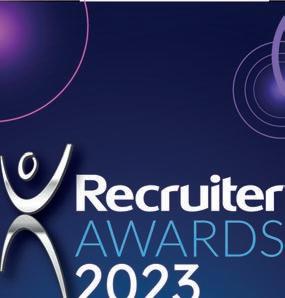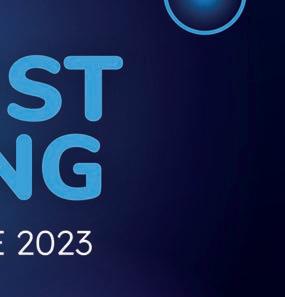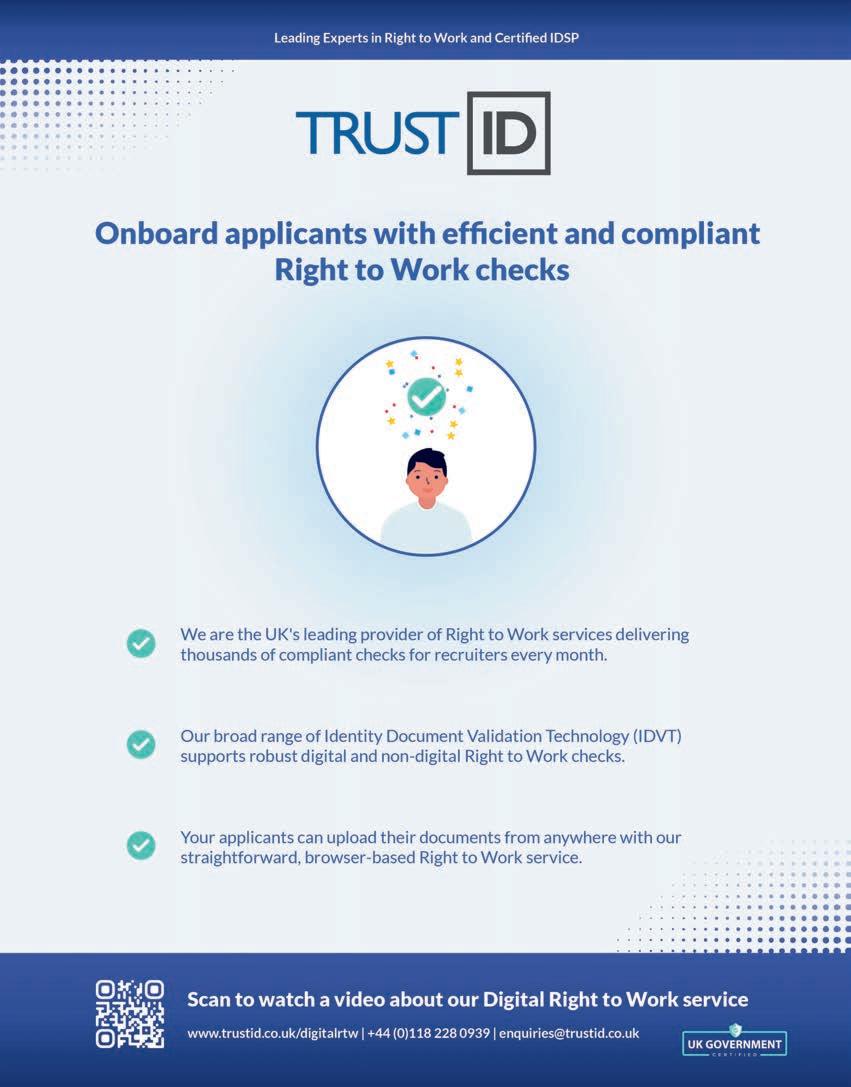Belgian staffing giant House of HR’s ‘buy and build’ strategy brings dividends


www.recruiter.co.uk INCORPORATING Recruitment Matters Business intelligence for recruitment and resourcing professionals May/Jun 2023


Chaps Contracting was established by our owner who had the foresight and determination to create an organisation providing payroll solutions for NOT just the recruitment industry but any industries that need support to ensure their payroll is fully compliant. At Chaps, we offer a full range of services and products for all your financial requirements: • 24/7 Service • Chartered Accountants • HR Full back-office Support • Up to date Industry Information • Part of the Chartered institute of payroll professionals • Chaps Direct Payroll (Pay Bureau) • Chaps Umbrella (Contractor/CIS) • Chaps Global Payroll • PAYE Payroll • Invoice Finance/ Factoring Call our experts now: 01543 212016 www.gochaps.co.uk Chaps Contracting Services One Stop Shop For All Your Business Needs











































COVER IMAGE | GETTY
RWWW.RECRUITER.CO.UK 3 14 E COMMUNITY 32 Social 35 My Brilliant Recruitment Career: James Cronin 36 Movers & Shakers 37 Recruiter contacts 38 The Last Word: Alan Furley INCORPORATING Recruitment Matters 38 18 24 16 C INTERACTION 16 Viewpoint Jen Richardson, STEM recruiter 17 Soundbites D FEATURES 18 THE BIG STORY House of HR Since 1995, this major European player has gone from strength to strength 24 The rise of AI: An Innovative Touch Job boards are at the forefront of finding out what employers want, and candidates need 29 CASE STUDY: Digital badges A revolution has begun – data-driven badges that find employers the right talent A NEWS 04 The future of recruiting A new report from LinkedIn offers 17 predictions based on interviews with global talent leaders 06 Empresaria presents more joined-up offering The group will launch a new solutions business this year 06 Recruiters represent the talent pool Recruitment consultants play a more strategic role 07 Indeed evolves to meet employers’ needs Indeed aims to be seen as a ‘matching and hiring platform’ 08 Contracts & Deals B TRENDS 10 Business Advice Sid Barnes on reviewing, attracting and securing top-class employees for a business’s long-term strategy and goals 12 Insight Time for optimism: Playing your cards close to your chest could be the key to enticing a buyer 14 Tech & Tools The latest recruitment technology and services
Leader






Skills, skills, skills – absolutely the top word at the moment, and hopefully, for a very long time to come! Can a new hire carry out an activity? Do they have the common sense to figure out a tough problem? Have they learned lessons that only life can teach them as opposed to relying on book and lecture learning only?
As new jobs are created that have never previously existed, the world of business is finally recognising the necessity of skills, both tangible and intangible, to make a company or a private- or third-sector organisation be able to do what it


does and will do. This recognition clearly affects how we recruit, hire and retain. The value of a classroom education stays intact as a means of gathering knowledge but not necessarily for picking up skills. While AI and ChatGPT dominate much discussion in recruitment at the moment, the dawning of skills recognition reflects human advancement in thinking. And this is truly an exciting development.
Welcome to the future of recruiting in 2023
 BY DEEDEE DOKE
BY DEEDEE DOKE
A SHIFT TO DATA and fact-based decisions in recruiting and hiring will put considerations of education and years of professional experience in the background, and make recruiters true change-makers in their organisations in the evolving future of work, according to a recent report from LinkedIn.
The report, ‘The Future of Recruiting 2023’, offers 17 predictions based on interviews with global talent leaders, surveys of thousands of recruiting professionals around the world and analysis of “millions” of data points generated on Linked In. The strapline says, “You can’t foresee the future –but you can help create it.”
In addition to having the proverbial ‘seat at the table’ of leadership, recruiting leaders “have the opportunity to actually change the seats at the table. You’re going to truly change the table itself”, the report quotes Brett Baumoel, vice president of global talent acquisition (TA), engineering, at Microsoft as saying.
DeeDee Doke, Editor



As recruiting becomes more strategic, 65% of TA professionals agree that the team can claim the seat and exert more influence at higher levels of their organisations.
“Recruiting professionals have never been able to make a bigger impact than right now,” Baumoel is quoted further.
“Now you can say, I changed the make-up of our company, I changed where we work, I changed what we look for, and I changed how we hire.”





WELCOME
4 RECRUITER MAY/JUN 2023
“This recognition clearly affects how we recruit, hire and retain”
The 17 predictions are: Recruiting will be recognised for driving businesscritical changes.




Recruiting will have more say over pay. For now, the report says, only 40% of TA respondents to the LinkedIn surveys say salary increases within their organisations are enough to keep pace with inflation.


Recruiting will double down on employer branding as talent retains its leverage in the labour market. In the report, 55% of respondents say their recruiting budgets will drop or stay flat this year. However, 59% say investment in employer branding will increase this year. “Your employer brand has to be more than a talking point used for pitching candidates – it has to become a real operating principle for your business,” said Stephen Lochhead, senior vice president of global TA at Expedia, according to the report.
Recruiters will need a more strategic set of soft skills. The top five identified by respondents are: communications, relationship building, adaptability, collaboration and problem solving.
Recruiting will collaborate more with learning and development (L&D).



Generative AI, tools that intelligently generate content, will let recruiters focus on the human part of hiring. Despite hiring headwinds, employers will remain committed to building a diverse workforce. According to the report, 79% of respondents said the uncertain economy was not lowering priority for diversity, equality and inclusion. Employers will hire more contract workers as a hedge against uncertainty.
Companies will keep a closer eye on what candidates want most. The fastest-growing ‘wants’ are: happy and inspired employees, flexible work, supportive management, a collaborative company culture, flexible working, shared
values, compensation, job security, work-life balance. Recruiting professionals will recalibrate their pitches to candidates.




Gen Z will reward employers who value development and diversity.
Skills-first hiring will become the gold standard. “Skillsfirst hiring is poised to be the way of the future,” the report says. “Recruiters have been trained to copy and paste a job description so they can hire really, really fast,” said Jennifer Paylor, vice president, global talent innovation and skills transformation at Capgemini. “They’re not really looking at what the work requires and what skills are needed. That’s starting to change.”
Skills-first hiring strategies will shine a light on overlooked talent.




Companies will focus on mapping the skills employees have (and need). The report said: “A whopping 91% of recruiting professionals told us that understanding employee skills is required to make informed talent decisions.”








“Business leaders will recognise the value of filling open roles with home-grown talent.” LinkedIn data shows that employees stay at organisations almost two-times longer if the employer is highly committed to internal hiring. The report also suggests the “growing probability” recruiters will be adding internal mobility to their responsibilities. Upskilling will be a key tool for retaining a diverse workforce.
Learning will be a compelling drive for candidates, not just employees.
As part of ‘The Future of Recruiting 2023’ report, regional editions are available for a variety of countries and areas, including the UK. Industry-specific reports are available for healthcare and staffing.

NEWS UPDATE WWW.RECRUITER.CO.UK 5 IMAGES | ISTOCK
BY DEEDEE DOKE


 GLOBAL RECRUITMENT GROUP
GLOBAL RECRUITMENT GROUP



Empresaria presents more joined-up offering to clients Recruiters ‘represent the talent pool’



























Today’s recruitment consultant has a strategic role to play in business as “the representation of a talent pool”, according to Adam Hawkins, head of sales – search and staffing industry vertical, talent solutions – EMEA & LATAM, of LinkedIn.
That role is in contrast to that of the in-house talent acquisition specialist, who is an adviser, Hawkins says, but “very much focused on more of a narrow pillar which is, how does my business show up in the market? How does it authentically engage with talent and on the skill profile that’s needed now and in the future?

“It’s their job to articulate to the business that if we want to be competitive,” Hawkins goes on to say, an organisation must be able to demonstrate who and what they are “or we need to change processes”.
Hawkins spoke with Recruiter recently at the launch of LinkedIn’s ‘The Future of Recruiting 2023’ report (see p4). “When I look at the role of the recruiter, that’s more of a strategic role because they are the representation of a talent pool as opposed to a talent pipeline, a pipeline being a group of people that map to my current and future skills needs.
“When you’re looking at that whole talent pool itself, I think you have to represent the market and you know, for most recruiters now, the world is more borderless than ever before. They have to have an aggregated view of trends overall for currency and they have to lead with the insights. They have to look at skills and talent flows. They’re in a unique position.”
Empresaria will launch a new solutions business later this year to give clients “a much easier way to buy from us” across multiple regions and sectors, according to its CEO.
Founded in 1996, Empresaria operates six diversified sectors in 19 countries and supplies to a number of others.

Speaking exclusively to Recruiter, Empresaria CEO Rhona Driggs (below) said: “With the group being so diverse and spread out, it’s complex for a client to buy from us in multiple locations.”
The company intends for Empresaria Solutions to stand as one of the company’s “pillars”, with others recruitment process outsourcing (RPO) solutions and
offshore recruitment solutions. The coming year will see greater emphasis on RPO, Driggs said. “We’ve got a better offering than we’ve had before, a more organised offering that we’re able to take to our clients and sell more proactively,” she explained. While many RPO competitors will have a “fairly fixed” offering to provide clients, “we’re looking to give the clients the solution that is what they need, so we’ll ask them what they want, and then we’ll deliver that – rather than saying you can pick from these three different options”, Driggs added.
Internally, Empresaria is reinforcing “that pulling together of the group, as more of a single sort of concept or a single company joined up” to help its nearly 3,000 employees to better identify as a collective.
NEWS UPDATE 6 RECRUITER MAY/JUN 2023
39,453 FOLLOWERS AS OF 27 APR 2023
Indeed evolves to meet employers’ openness on sourcing talent
BY DEEDEE DOKE
EMPLOYERS’ IDEAS ABOUT candidate quality are evolving as they become “more open minded” about what they look for in potential hires, according to Raj Mukherjee, executive vice president and general manager at global job search giant Indeed.


Indeed, which says it aims to be seen as a ‘matching and hiring platform’, is itself evolving as it introduces a ‘pay for results’ (PFR) pricing model for employers to be charged when they hire a candidate through their advertisement.
PFR includes pay-per-application (PPA) and pay-per-startedapplication (PPSA). Indeed says that PPSA “delivers quality applicants that meet an employer’s preferences and charges them only when they receive an application, rather than when they receive job ad clicks”. PFR supplements but does not replace the long-time ‘pay per click’ pricing method.
In an exclusive interview with Recruiter, Mukherjee was asked how Indeed defined “quality” in terms of charging employers for candidates’ applications. “As they
say, quality is in the eye of the beholder,” Mukherjee said. “So, in this case, it’s an employer who has to first give us information on what they mean by ‘quality’. I always believe that quality starts with the job description. Whatever job they post, they will understand ‘here are the things I need to share with the system for me to get qualified or quality candidates’.”
Mukherjee referred to the first tier of ‘need to know’ points as “screener questions”, which help identify key starting points for the role in the employer’s eyes. Location and experience in a niche field could be examples of screener questions, he said. “The employer might think, these two points are really important, so that means we would deliver you applications” that respond with certain answers.
“You could add those as deal breakers as part of your job posting. We respect that, so that’s part one of what we call determining quality. In the second part, you could add specific assessments. We
have a series of segment by vertical by occupation assessments that provide for employers to ask questions and validate whether this person has the necessary skills for the job they’re looking for,” Mukherjee went on to explain.
Then the hiring manager may think that a candidate “looks good on paper but doesn’t meet this other criteria that I have. And so we are also learning as you’re doing that, and in fact, the whole PFR system is designed to learn and become more effective for you”, Mukherjee said.
Ultimately, he said, “this is where I think we are putting our money where our mouth is. We’re saying we’re not always going to get this right, so we’re going to let you determine what the quality is and allow you to reject and replace applications”.
The new pay system incorporates machine learning and AI, Mukherjee acknowledged. “Indeed is in this journey of evolution, where we are becoming this matching and hiring platform because employers want us to become that,” he said.
Of employers, he said, “we have seen employers become more open-minded and start relaxing requirements… and evolve their thinking… Their notion of quality has evolved and it’s not really relaxing quality. It’s just about being open-minded about people that may be a great fit for your role.
“It’s not just the people on paper who have the right experience. Maybe this person on paper doesn’t exactly fit the bill, but as I speak to this person, their motivation, their experiences they have had –well, these really put them at the top of my list.
“So,” Mukherjee said, “it’s less about the PPC model or PPA models; it’s much more about employers’ openness and thinking about how to source talent.”
Read more about Indeed in the job boards feature on p24.
NEWS UPDATE WWW.RECRUITER.CO.UK 7 IMAGES | SHUTTERSTOCK/RAJ MUKHERJEE
CONTRACTS & DEALS
Deel
HR platform provider Deel has announced a “strategic” partnership with talent acquisition platform RAMP Global to provide thousands of enterprise customers with access to global talent to grow its teams at scale. Deel says its partnership with RAMP demonstrates its commitment in helping enterprises fill vacant roles at a time when the global war for talent continues to intensify.

Breakthrough
IT consulting firm CGI has partnered with apprenticeship provider Breakthrough, which recruits directly from prisons. The organisation offers apprenticeship programmes to both prison leavers and those from underprivileged backgrounds who face barriers to employment.
AMS
Global talent solutions firm AMS has announced a three-year partnership with Tesco Bank to provide volume hiring of permanent customer service talent, delivering contingent workforce requirements for both professional contractors and interim roles. AMS will embed a team of 35 talent experts within Tesco Bank’s operations across the UK.
DEAL OF THE MONTH
The Jarell Group and Temp Source
Two West Midlands recruitment firms have announced a joint venture, which aims to create the region’s largest logistics jobs firm by 2028. Workforce solutions specialist
The Jarell Group has finalised the partnership with logistics recruiter Temp Source, to offer hundreds more permanent and temporary roles to professional drivers, managers and warehouse operatives within
the transport and logistics sectors.
As a result of the JV, The Jarell Group’s James Cronin becomes executive chairman, working closely with Temp Source’s joint managing directors, Josh Allen and Aaron Hillman.
The partnership will also see a series of new recruitment roles created in 2023 due to more than 500 professional HGV and light vehicle drivers registering in the past quarter alone.
EuroJobsites

EuroJobsites has acquired Space-Careers. com to expand its leadership position in the European job boards for senior STEM candidates. EuroJobsites, which is the leader in niche jobsites, now offers recruiters the ability to attract top space-industry talent through its acquisition of Space-Careers.com.

GMP Recruitment
Engineering, manufacturing, logistics and administration recruiter GMP Recruitment has finalised the takeover of The Recruitment Company Midlands, also known as TRCM. Both firms are based in Worcester. As part of the deal, staff will move across to GMP Recruitment with TRCM’s current directors, including founder Tony Maguire, stepping away from the newly merged business. TRCM’s Sansome Street offices will also close and be merged into GMP’s Worcester base.

Heidrick & Struggles
Executive search firm Heidrick & Struggles has entered into an agreement to acquire businessfourzero, a London-headquartered consultancy specialising in developing and implementing purpose-driven change. H&S says this acquisition will “deepen” its existing set of leadership advisory and culture and organisation solutions and accelerate its ability to help clients drive successful business transformations by linking purpose and strategy to leadership and culture.

Sterling Check Corp

Sterling Check Corp has acquired background screening provider A-Check Global. The deal was introduced by an investment banking firm the1, who negotiated the transaction on their behalf. A-Check Global was founded in 1998 as a member of the ActOne Group of companies. The clients of A-Check Global will continue to receive support in addition to new advantages from Sterling’s market knowledge and a wide range of tech-enabled services, according to a statement from the companies.

8 RECRUITER MAY/JUN 2023 NEWS CONTRACTS
More contract news at recruiter.co.uk/news











Engaging and retaining senior staff
How to secure and attract top talent to deliver long-term business goals
 BY SID BARNES
BY SID BARNES
The war for talent is as fierce in the recruitment sector as it is in any other. Given that recruitment is predominately a people business, the need to secure and be able to attract top talent is critical to survival, short-term growth and longer-term competitive advantage. Staff retention and attraction have long been cornerstones of
10 RECRUITER MAY/JUN 2023 TRENDS BUSINESS ADVICE
successful recruitment businesses and should always form a key part of the business strategy. What were once considered market leading offerings to colleagues are now seen as mere entry-level minimums. Businesses must stay current and make use of new retention and attraction opportunities where appropriate.
Competitive salaries and commission schemes, car allowances, holiday
entitlement, healthcare, flexible working, advanced onboarding and training, personal development, study leave, corporate social responsibility and equality, diversity & inclusion policies are now all part of the standard employee value proposition (EVP) that every business must be able to demonstrate and articulate.
Additionally, businesses are required to communicate a compelling purpose, mission, vision, values and leadership charter that galvanises and grows a successful team. These are essential foundations in developing a culture where people want to stay and people want to join. Many businesses put their emphasis on creating client and candidate propositions, at the expense of developing their colleague propositions. While this was normally enough to secure most staff, it is no longer always enough to secure senior staff, management and leadership. This realisation has led many businesses to make use of an Enterprise Management Incentive (EMI) and, or a Long-Term Incentive Programme (LTIP) as part of their armoury, as they look to tie in key staff over a three-to-five-year period.
An EMI scheme is an employee share scheme, which is government approved, tax beneficial and a flexible way of incentivising staff. It is mainly used by small to mid-size SMEs and enables employers to reward employees for their efforts via share options that can give them an investment in the future of the business.
An LTIP is an incentive bonus that makes payments based on the achievement of specific goals and incentivises employees over a longer period, rewarding performance. The LTIP is not tax beneficial, but is highly effective as a scheme for incentivising and rewarding over a longer period.
Over recent years, the use of both the EMI and the LTIP schemes has grown considerably. Many examples have surfaced in the public domain of businesses creating and paying out on EMI schemes that have vested. Some high-profile businesses even advertise

their EMI schemes and LTIPs on their websites, for talent attraction.
Some organisations use both EMI and LTIP schemes so that they can reward more of their staff. One business I work with has chosen to include every single employee in their EMI scheme. Their levels of engagement, productivity, retention, and results are outstanding. Coincidence? No.
A growing number of businesses have chosen to utilise the Employee Ownership Trust (EOT) model, which allows the employees to own the company by setting up a trust that owns more than 50% of the business. This provides owners and employees with a government-backed tax beneficial scheme that allows employees to buy out owners. The scheme allows for a maximum of 40% of the total staff to be part of the EOT.
Employee owners are responsible for all operational aspects of running the business. Through a trust that holds the shares, they “own” 51% of the business and will decide and execute all aspects of delivering the business plan. However, the business will continue to be operated by the existing senior management team, along with a newly formed Board of Trustees.
The profits generated by the business will be used to pay the owner for the shares that were bought by the Trust. When profits and cashflow allow, a contribution can be made to the trust, which is then available to be shared amongst the employees. Employees can receive up to £3,600 per annum tax free under current tax rules.
The EMI, LTIP and EOT offerings can be invaluable tools in creating cultures of shared success and collaboration. Leaders need to paint a compelling picture of the future and demonstrate the shared journey, the individual’s role within it and their subsequent rewards. The EMI and LTIP schemes help business owners to answer the increasingly asked, “Why should I stay?”, “Why should I join?”. ●
SID BARNES is CEO of Mastermind Consulting and co-chairman and owner of Elite Leaders.
WWW.RECRUITER.CO.UK 11 TRENDS BUSINESS ADVICE IMAGE ISTOCK
“Businesses must stay current and make use of new retention and attraction opportunities where appropriate”
↗
TIME FOR OPTIMISM — PATIENCE AND DEMONSTRABLE RESILIENCE WILL PAY OFF
There are buyers around, but playing your cards close to your chest could pay dividends
In the face of weakening recessionary concerns, macroeconomic volatility and geopolitical uncertainty, the UK recruitment market continues to demonstrate resilience. Amidst prevailing structural skills shortages and acute candidate scarcity in the UK, hiring activity remains buoyant and quoted company share prices continue to signal business and investor confidence in the UK economy and its labour market.
At a macro level, in March the Office for Budget Responsibility reported that the UK will avoid a recession this year and inflation is expected to fall to 2.9% by the end of 2023. Moreover, leading commentators such as the CBI expect that interest rates are now close to or at their peak below levels being forecast, with cuts to the base rate expected in 2024.
At a sectoral level, both generalist and specialist-quoted UK recruiters have continued to evidence strong trading performance in recent periods. PageGroup plc reported that between its third and fourth quarter (year-end Dec-22), net fee income rose by 3.5% and for the full year 2022, grew by 20% year-on year. In addition, leading STEM recruiter SThree plc reported its revenue rose 22% year-on-year, with temp and perm revenues rising by 22% and 8% respectively.
Over the past 12 months, the erosion in the value of sterling relative to the dollar (c. 8% reduction year-on-year) has been indicative of wider UK market volatility. Despite this, overseas
TRENDS INSIGHT 12 RECRUITER MAY/JUN 2023
acquirors have signalled that they see a significant opportunity to invest in the UK and there is a prevailing perception that UK assets are priced at a relative discount and therefore recruitment sector assets present good value for international investors.
With what is viewed as a positive backdrop for the sector with acute candidate shortages across several areas, one would expect the market to be brimming with buyers. There is, however, a disconnect between the resilience and prospects of the UK recruitment sector and the current level of appetite for M&A activity.

To be clear there are buyers around, just not in the volumes that one would expect in such a buoyant period for the sector and with the economic backdrop outlined above. So what is driving this?
● Private Equity
Private equity appetite and willingness to invest in the UK recruitment sector has significantly reduced in the last 12 months. In the second half of 2022 this was in part due to macroeconomic concerns and the perceived medium-term prospects for recruiters in the face of a slowdown, particularly those which are perm heavy.
Availability of debt from mainstream banks and private debt funds has constrained activity due to increased interest rates making debt more expensive, leverage multiples falling meaning private equity having to put more of its own money in to deals which is driving down returns with a corresponding impact on multiples paid. Multiples are out of line with vendors’ expectations which have not moderated based on strong underlying performance.
Our expectation is that the constraints in the debt markets will reverse in late Q2/early Q3 this year which will see private equity investors return to the market with significant levels of “dry powder” and an ability to pay strong multiples backed by greater debt availability.
● International buyers
Significant nervousness exists from international buyers around the UK macroeconomic landscape. The UK, which has consistently been viewed as a “safe” place to invest, has seen its credibility undermined in the aftermath of the Truss mini budget in September 2022. This has significantly undermined confidence in UK macroeconomic policy and the attractiveness of the UK as a place to deploy funds.
Whilst the financial cost to “UK plc” can be readily estimated, the damage to the UK’s reputation may take longer to assess and restore. As a consequence of the UK’s blighted reputation, there is a noticeable trend in overseas buyers prioritising other markets in terms of M&A activity, such as Germany and Benelux.
● Domestic strategic buyers
There are still acquisitive and well-funded UK strategic buyers in the market which is positive news for those with shorter-term realisation ambitions. With private equity buyers largely out of the market there is a clear “window of opportunity” for those buyers able to pursue deals quickly. When private equity returns to the market with leverage available, this will likely drive multiples higher.
What is the current advice for recruitment business owners?
The M&A market is currently soft. There are buyers around, but the number and variety of buyers will
significantly increase over the next couple of quarters.
Business owners who are looking to realise value should spend the next few months productively focusing on key areas which will attract significant attention and influence execution risk and the outcome achieved in conjunction with your advisor. When private equity and international buyers return to the market in Q3 2023 there will be a “flight to quality” with organisations able to be very selective on which assets they acquire.
It is therefore of fundamental importance for business owners to be able to present a credible narrative to support the evolution of the numbers and demonstrate “best in class” KPIs, operational excellence and compliance to attract and retain interest. Taking time and seeking advice to understand how these will be assessed by a buyer and what can be done to address any shortcomings will be time and money well spent and minimise execution risk in a transaction.
Conclusion
Business owners should be clear that momentum and optimism in the market remains. With improving macroeconomic fundamentals, investor confidence is continuing to reset and will improve in 2023. The sector’s fundamentals remain strong, with no sign of wavering in a structurally tight labour market. However, the current environment offers a precious window of time to create, enhance and maximise shareholder value ahead of the next wave of consolidation which seems poised to break in Q3 2023. Be patient and demonstrable resilience will pay off later this year. ●
WWW.RECRUITER.CO.UK 13 TRENDS INSIGHT IMAGE ISTOCK
↗ SIMON
MARSDEN is director at Gambit Corporate Finance
Business owners who are looking to realise value should spend the next few months productively focusing on key areas
TECH & TOOLS
IN FOCUS: Recruiting in the metaworld
BY SUE WEEKES
When Facebook changed its corporate name to Meta in 2021, it triggered a wave of media stories about how the metaverse – an immersive 3D virtual space where anything seems possible – might affect our lives. There seemed little doubt that this virtual world would become a reality given tech giants such as Google and Microsoft were also ploughing huge investment into the sector.
For most of us, though, at least outside of industries like gaming, the metaverse is yet to make an impact on our lives but to dismiss it as hype would be wrong. A survey carried out by global management consulting firm McKinsey revealed that 95% of business leaders expect the metaverse to have a positive impact on their industry within

five to 10 years and 61% reckon it will change the way they operate. Indeed, it isn’t difficult to envisage how it might impact recruitment in areas like online recruitment fairs and virtual assessment. Moreover, the metaverse uses technologies such as virtual and augmented reality, which are already familiar to some recruiters. Plus, the concept of the metaverse builds on the remote and virtual working mindset shift that many recruiters had to adopt to survive during the pandemic.
The use of the metaverse in recruitment is far from new. Fast backward in time to 2007 to the virtual world of Second Life, which likes to call itself the ‘first metaverse’ or the ‘original metaverse’. It famously held a recruitment fair, which attracted names such as Microsoft, Verizon and Hewlett-Packard while Manpower Incorporated was
among the companies with a Second Life office and staged a live event inside the virtual universe called The Evolution of the Virtual Workplace, featuring avatars of real people.
ManpowerGroup continues to innovate in this area and at the Viva Technology start-up and tech event in Paris in June is set to unveil The New Human Age lab, which it says explores the intersection of talent and technology. It will showcase a number of innovations including the Experis Academy in the metaverse (Experis being ManpowerGroup’s IT professional resourcing, project services and managed services specialist), as well as augmented and virtual reality (VR) learning, immersive onboarding and upskilling.
Last year, Hays became one of the first recruitment agencies to enter the metaverse. At the time,
14 RECRUITER MAY/JUN 2023
TRENDS
TECHNOLOGY AND SERVICES
Alfie Whattam, founder of software engineering recruitment company Alfa Technology, was involved in the project as then UK&I national lead, Hays Software Development Recruitment. He explains that the Web3 landscape was exploding in popularity, so he built an office for Hays in VR, and publicly released the room as a “minimum viable product” pilot. He is now involved in an advanced metaverse project at Alfa, which aims to create a VR workroom for the purpose of hiring leaders and quizzing candidates for their respective companies. The artificial intelligence, machine learning, and blockchain technology which underpins this platform is being spearheaded by Dr Linda Yu, chief research officer at Alfa Technology.
“The history of job interviews has always been driven by the advancement of innovative technologies – from in-person
meetings, to telephone calls, to video platforms like Zoom,” says Whattam.
According to the World Economic Forum, at this early stage the metaverse can develop in many ways, depending on research, innovation, investment and policy. It is working with technology and other sector companies alongside experts, academics and civil society to accelerate the development of governance and policy frameworks to ensure a viable, interoperable, safe and inclusive metaverse. It is itself building a Global Collaboration Village as the virtual future of public-private co-operation in collaboration with Accenture and Microsoft, which will comprise immersive spaces where stakeholders can convene.
The other side of the metaverse discussion for recruiters, of course, is the potential for it to create many more jobs. Accenture operates its own metaverse, the Nth floor, where the employees participate in new hire orientation and immersive learning or meet as teams. It reported in March 2022 that the company expects 150,000 or more new hires will work in the metaverse on their first day over the fiscal year.
Key developments this year which could help to shape the future of adoption could be the announcement by Apple at its next developer conference in June of a mixed reality headset. Meanwhile, McKinsey sums up the future challenge of the metaverse to organisations from all sectors well when it says “it’s too big to ignore – yet its future is far from certain”, adding that companies need to “dip a toe in the water and plan to plunge should developments warrant”. ●
IN BRIEF
Generative AI tool aims to transform talent processes

Talent lifecycle platform specialist Beamery has launched TalentGPT that uses its own proprietary artificial intelligence (AI), as well as OpenAI’s GPT-4 technology and large language models (LLMs) to create more personalised experiences for recruiters, candidates and employees. It can generate new job descriptions and make them highly relevant to the skills that organisations lack and the capabilities that make individuals high performers. It can also generate and contextualise email templates to the exact candidate audience an employer is trying to reach. Beamery’s proprietary AI technology has been developed across three years and tracks more than 17 billion data points.
beamery.com
Taking the manual effort out of recruiting
The developers behind Recruiting CRM carried out research with more than 1000 recruitment professionals to identify their major main points. It revealed that for many, the major issue remains the time and effort spent on manual tasks and lack of specialised solutions. Recruiting CRM is a recruiting management platform designed specifically to help small recruitment agencies and independent recruiters reduce the time spent on such repetitive processes. Recruiters can streamline workflows and spend more time on value added tasks. The platform is integrated with the TalentRoom recruiting marketplace which allows recruiters to showcase their candidates anonymously. www.recruitingcrm.com/
Borderless team-building
G-P Meridian is a customisable SaaS employment product suite designed for companies to build and manage teams. It has been developed by Globalisation Partners which is committed to helping companies build “borderless teams” in minutes. G-P Meridian Suite provides a control centre for building and managing teams from a single dashboard and modules of the suite include G-P Meridian Core for onboarding, management and compliance, and Prime for enhanced support and global management. It also offers G-P Meridian Select, which is a set of standalone solutions and add-ons. www.globalization-partners.com
WWW.RECRUITER.CO.UK 15 TRENDS TECHNOLOGY AND SERVICES IMAGE ISTOCK
Agile working wins out Taking flexi working to the next stage
 BY JEN RICHARDSON
BY JEN RICHARDSON
Itake my holidays during deepest, darkest winter. There’s something smug, but also sensible about sunbathing when it’s bitterly cold in baltic January. It’s also my birthday month and flights are temptingly cheap. No-brainer, right?
HALT! January is also the busiest month in recruitment. It’s the tail end of the ‘new year, new me’ candidates and I’m busier than ever.
However, I can make this work. I’m fortunate to work for an organisation whose reward schemes include unlimited paid holiday and agile working. So, what’s the difference between this agile and flexible working thing?

Well, flexible working usually refers to working hours. Agile working takes that a step further, breaking down traditional working barriers and making things as adaptable and efficient as possible. It’s also associated with ‘wellbeing’, and my idea of wellbeing is topping up my Vitamin D reserves and putting my flip-flops on.
So, off I trot to Lanzarote – alone, to a gorgeous, quiet resort. Four-star hotel on the beach. Room with a view. All inclusive.
The way I see it, I’m not actually on holiday, but here for a



change of scenery. That might sound like an expensive change of scenery to you, and you’d be right. But with my biggest ever January billings, which followed a hugely successful 2022, commission covers these luxuries. And the Canarian climate recharges my batteries. The sound of the waves gives me space to think and conjure up new ideas.
So how do I make it work for me?
I begin each day by clearing emails, followed by a stack of pancakes, bananas and chocolate sauce. Once I’ve demolished those, I’ll go for a walk along the beach. Mornings also consist of a couple of ad hoc calls. And of course, a large cerveza or pina colada under a palm tree, occasionally on Microsoft Teams to ‘rub it in’ to the team back in Cambridge.
Afternoons are all about lunch, sunbathing and snoozing by the pool. Tending to the odd email or call here and there. Bliss.
By about 4pm, I’m done with the sun. And I get bored. From then, through to bedtime, I’ll plough through work, without distraction, I break it up with a meal in the buffet and an agua con gas. Rock ‘n roll! The piano bar is not really my thing and the age demographic in this hotel was around 60-70. I’m not quite there, yet.
So what are my conclusions? I monitored my ‘laptop hours’ during that week: 24-25 hours. We’ll call it five hours’ ‘proper’ work a day.
What did I learn? Well, I certainly rested, was productive and even proactive. I returned refreshed and with a tan – result!




This highlighted, though, that I can only really work like this alone. Anybody I’ve been away with in the last year will confirm that I shut myself away with my laptop for two hours a day to keep on top of work, but any more becomes anti-social.
I’m still not sure if this was a holiday or agile working. Both, probably. I’m lucky that my company recognises hard work and rewards me with perks that allows me to have a blended work-lifestyle that suits me, scratches my ‘travel-itch’ and enables the workaholic in me to be sensible about taking a break. ●
C INTERACTION VIEWPOINT 16 RECRUITER MAY/JUN 2023
JEN RICHARDSON recruits for and supports STEM organisations in Cambridge
IMAGE | ISTOCK
WEBCHAT
WILL USERS BE PENALISED FOR NOT ACTIONING CANDIDATES?


Our story on recruiter.co.uk on 19 April 2023 was about the news of Indeed adding a new tier of service with pay-for-performance pricing (‘Indeed adds new tier of service with pay for performance pricing’, 19 April). As well as receiving reader responses, we have expanded our coverage in the magazine this month, with a news story on p6 and within our feature on the future of job boards on pp24-27.
Jamie Mistlin, co-founder and client director at Recruitment Revolution, also posed an interesting question regarding the news story.
“On Indeed’s new pricing model, is the action of charging if the user doesn’t do something (action candidates) amount to a penalty? Which contract law doesn’t favour very well.
We had a similar provision in our model years ago.”
We look forward to further reader responses to Jamie’s query.
MATT COLLINGWOOD MANAGING DIRECTOR, VIQU

“Here at VIQU, we’ve used Twitter since the day we launched. We’ve always liked that it is a free platform that we can use to connect with certain communities. However, it feels like [owner] Elon Musk is making changes more often than I change my underpants. This latest move is unnerving. If Musk keeps making changes, and goes down the route of requiring payment from all accounts (which is how it’s looking!), we will be forced to delete our account. It’s a huge shame for SMEs with limited budgets, like VIQU, who have benefitted from exposure from Twitter, but we certainly won’t be dictated to by Musk’s daily bullish antics.”

KATE SHOESMITH
DEPUTY CEO, RECRUITMENT & EMPLOYMENT CONFEDERATION
“At the REC, we have a presence on Twitter and we use it as a way to communicate with our stakeholders – especially journalists, thought leaders, politicians – but also REC members. Some REC members also have Twitter accounts but I’ve seen few have a blue tick, so my suspicion is it will be business as usual for many users, including recruiters and their candidate base. We’ll be watching the change with interest. It’ll be important to review any impact the change has on ‘spoof’ accounts, whether people change their interactions with Twitter users to prioritise engaging with blue tick verified accounts or not, and we will be tracking if the blue tick has any impact on our social reach.”
SAM WASON
CO-FOUNDER, CATHCART TECHNOLOGY

“It’s a cheap way for the ex-richest man in the world to look less foolish and make a tiny bit of dough from his idiotic investment. If it was widely adopted and accepted it would destroy the democratising ethos of Twitter, which is what made it a success in the first place. But it won’t be widely adopted. It’ll create a two-tier system that favours those who shout loudest. This might work for a while in terms of boosting traffic, but only because people are more likely to look at a burning building than at one that’s operating normally.”

INTERACTION SOUNDBITES WWW.RECRUITER.CO.UK 17
“What do you think about the new pay-to-play verification on Twitter?”












THE BIG STORY: HOUSE OF HR 18 RECRUITER MAY/JUN 2023
The company’s origins go back to 1995, and there is no slowing down for a major player in the recruitment game
By Rachel Masker
House of HR has grown in just over 10 years from a Belgian-based staffing group to one of Europe’s biggest recruiters.
Set up in 2012, under the Accent umbrella, the group has spread its net across the continent. It has a presence in 11 countries, mainly operating in Belgium, Germany and the Netherlands. It also has branches in France, Spain, Poland, Romania, Hungary, the Czech Republic, Luxembourg and Italy.
Last year the holding group had a
turnover of €2.2bn (£1.95bn) and an internal headcount of more than 5,000 spread across 700 offices. Its speedy expansion is largely down to deep-pocketed private equity partners and so-called ‘buy and builds’ – the bolting together of smaller companies to create a business empire.
In May 2022, House of HR sold 55% of its stakes to US private equity giant Bain Capital in a mega-size deal. From IT service provider Solcom in Germany to healthcare provider TMI in the Netherlands, the group is
constantly looking for new opportunities to add to the group’s impressive portfolio.
But there are no plans at present to expand into the UK, says CEO Rika Coppens, who was named among the top 50 most powerful HR women in the world. She added: “That being said, our expertise in foreign recruitment and in certain niche areas could also add value in the UK market, so who knows? Maybe going forward, we will make that step. Never say never.”
Asked how important the buy and build strategy has been to House of HR’s growth, the well-regarded CEO said: “Having a private equity partner in your ownership brings expertise, a large network and flexible financial opportunities to grow faster with more or bigger M&A [merger and acquisition] deals. With our new partner Bain, we are working together on a bright, strong future for House of HR.”
How it all began
The company’s origins date back to 1995 when Conny Vandendriessche and the late Philip Cracco founded Accent, a temporary employment agency. The duo opened their first office in Roeselare, Belgium, where House of HR still has its HQ today. Today, Accent is one of the largest staffing companies in Belgium with a network of more than 300 offices across the country.
When House of HR was established in 2012, Accent remained as part of the group. French private equity firm Naxicap became majority shareholder with a 30% stake. Vandendriessche stepped down as CEO but kept a minority stake and a seat on the board. Cracco left the company. Within three years the holding group had expanded internationally with deals in the Netherlands, France and Germany as well as exploring other markets.
Ten years and about 30

THE BIG STORY: HOUSE OF HR WWW.RECRUITER.CO.UK 19 IMAGE GETTY
NO CHOC SHOPS PLEASE
Conny Vandendriessche founded Accent, which grew into one of the biggest HR players in Europe, out of “vengeance”, she says.
Vandendriessche felt overlooked by her father, who considered her two brothers the only viable successors to take over his wholesale plant business. “He tried to downsize my entrepreneurial ambition to a small chocolate store – the ultimate cliché for a Belgian girl. “I refused to do that,” she said in an article for Thrive Global.
To compensate, aged 31, she co-founded Accent combining the quality of an executive search firm with the flexibility of temporary contracts. The ‘temp to perm’ business model reaped dividends for both Accent and House of HR.
After an intense 20-year career growing the company,

she stepped down as CEO. House of HR was acquired by a private equity group, but Vandendriessche still holds 10% of the shares and a seat on the board. And the self-made entrepreneur is still doing her bit to increase diversity at board level both as a head-hunter and investor in female-led companies.

In addition to her role at House of HR, she is managing partner and founder of ‘We Are Jane’, a new private equity group. The fund prefers to invest in companies with high achieving women at the helm who may be under the radar of traditional private equity groups.
Vandendriessche also sits on several other boards and is an angel investor to young start-ups and entrepreneurs, harnessing her passion for business growth.
THE BIG STORY: HOUSE OF HR 20 RECRUITER MAY/JUN 2023
“Diversity is not only a buzzword at House of HR. We also show this in practice with 54% /46% split of women and men in management”
Rika Coppens, CEO, House of HR
acquisitions later House of HR, by now a major European player, sold out to Bain Capital. And company bosses doubled down on their buy-and-build strategy with 16 acquisitions completed in 2022. Turnover increased from €300m in 2015 to €2.2bn in 2021 due to targeted acquisitions and solid organic growth. The group estimates it will land an EBITDA of €350m in 2022, up on €272.7m in 2021.
Coppens (pictured above), who has been CEO since 2017, embodies the strong female leadership that is still important to the group. The CEO said: “Diversity is not a buzzword [for us]. We also show this in practice with 54% /46% split of women and men in management. A majority (of strong) women are reflected in the workforce with a 59/41% split.”

Coppens, who has a master’s degree in commercial engineering,

TIMELINE
2012 - 2014
Establishment of House of HR. French private equity group Naxicap enters the group as a majority shareholder with a 30% stake
started her career at PwC, where she worked as an auditor before progressing to chief finance officer at Bureau van Dijk Computer Services (2002-05) and Zenitel (2005-10). Until early 2017, she was CEO of EFR Group, where she was responsible for 1,100 petrol stations, shops and restaurants in Belgium, Netherlands, France and Luxembourg. Coppens entered the recruitment industry when she joined House of HR, first as a board member and then, a year later, as CEO.
House of HR ‘Happy Rebels’
House of HR is renowned for its multi-brand strategy and being growth focused. The holding group has acquired about 50 temporary employment and staffing companies all operating under their own brand in specialist markets. By merging small
Accent, now part of House of HR, has grown to 227 offices in Belgium and the Netherlands Conny Vandendriessche steps down at CEO but retains a minority stake in House of HR and a seat on the board of directors. Philip Cracco, who co-founded Accent leaves the company. Jerome Caille is appointed new CEO, a position he holds for 3 and a half years
2015:
Acquisition of Covebo in The Netherlands
Acquisition of Abylsen in France
Acquisition of Continu in The Netherlands
2016:
Acquisition of Gritt in Belgium
Acquisition of Zaquensis in Germany
Acquisition of TIMEPARTNER (TP) in Germany
2017:
Acquisition of Vialegis in Belgium
Acquisition of Redmore in The Netherlands
Establishment of NOWJOBS in Belgium under Accent Jobs
Rika Coppens appointed CEO of Accent Jobs and House of HR
THE BIG STORY: HOUSE OF HR WWW.RECRUITER.CO.UK 21 IMAGES | GETTY / HOUSE OF HR
HOUSE OF HR STATS
companies, private equity groups can boost sales and access larger financing pools for expansion, according to industry experts. But merging dissimilar cultures and integrating systems is often a challenge.
House of HR employees, however, are known as ‘Happy Rebels.’ Coppens explains: “We grant the companies that we acquire a lot of self-management within a decentralised structure. The local managers are empowered to do a lot of independent decision-making as long as they keep their promises in terms of results. Our hundreds of managers, who are also shareholders of HR, are a great example that we are strongly committed to ownership and accountability.”

English is spoken at the corporate level with all the companies. This ensures “a level playing field where everyone can raise their point,” said Coppens, adding they were all obliged to use common digital and reporting platforms which “sometimes takes time” to implement.
Today, founding company Accent is the largest direct subsidiary or so-called ‘powerhouse’ without House of HR.

Each platform company or powerhouse serves a certain sector or specialisation. For example, Cohedron has expertise in the public sector, Abylsen is an engineering company while Redmore is an all-round financial specialist.
Under each powerhouse there are add-on smaller acquisitions for ‘boutique’ brands. Boutique brands are active in the same field as their parent powerhouse or are purchased because they add an extra specialism. For example, Accent owns Gighouse, a matching platform for freelancers and NOWJOBS, a digital matching platform for students and flexi-jobbers.

The common theme in all the acquisitions, says Coppens, “is that House of HR supports each of its powerhouses to continue their growth ambitions and thus keep the entrepreneurial drive that House of HR is known for alive”.
She sought to explain the company’s USP as “Europe’s most exciting talent powerhouse, connecting people to possibilities, shaping the world of tomorrow.”
So, what is next for acquisitions? Coppens said the focus is on companies that complement its existing offering either in terms of industry specialisation, for example healthcare, IT and the public sector or candidate focus, such as engineering, legal and financial.
Geographically, its attention is on further expansion in the DACH countries of Germany (D), Austria (A) and Switzerland (CH) and “potentially the Nordics.”


Coppens declined to comment on Brexit. Asked why there are no plans to expand in the UK, she said: “The UK has never been our primary focus given that we believe our added value towards customers and candidates lies in the complexity of legislation and lack of flexibility offered by the traditional long-term contracts used by most companies. We believe the markets we currently serve are mostly characterised by complex legislation, hence giving us more opportunity to grow and add value.”
But the company boss repeated the line: “Never say never.” ●
THE BIG STORY: HOUSE OF HR 22 RECRUITER MAY/JUN 2023
“Our hundreds of managers, who are also shareholders of HR, are a great example that we are strongly committed to ownership and accountability”
Rika Coppens, CEO, House of HR
There is a majority women reflected in the workforce with a 59/41% split 700 OFFICES House of HR has a workforce of 5,000 spread across 700 offices
Last year the holding group had a turnover of €2.2bn IMAGES HOUSE OF HR / SHUTTERSTOCK
59%
€2.2bn
2018 - 2020:
Several ‘boutique” brands companies acquired by different ‘powerhouses’ including Belgatech, MT&V, Schollmeyer & Steidl, Vnom, ITDS, PI, Pharmacos, Mykelson, Eurojob, ETA, Techmatch and more
2021:
Establishment of House of HR Germany in response to the merger between TIMEPARTNER & Zaquensis

Acquisition of three new boutiques - Greenworking, Solyne and Avanti GMBH for powerhouses Abylsen, Continu Professionals and TIMEPARTNER

Acquisition by House of HR of a new powerhouse Cohedron in The Netherlands Cohedron acquires Vanberkel Professionals and Bureau Brug
2022:
Bain Capital, one of the largest private equity firms in the world, becomes the new majority shareholder with a 55% stake 16 acquisitions completed in 2022, including German IT service provider SOLCOM, a new IT powerhouse, Dutch healthcare providers TMI, France-based StaffMe and Germany-based LDPersonal
THE BIG STORY: HOUSE OF HR WWW.RECRUITER.CO.UK 23
AN TOUCH INNOVATIVE

TECHNOLOGY 24 RECRUITER MAY/JUN 2023
When the first job boards were launched in the early 1990s, they heralded a revolution. They liberated jobseekers to explore career opportunities 24/7 from the comfort and privacy of their desktop, while employers and agencies suddenly had an always-on and immediate way of putting their vacancies directly in front of the candidate. While web-based companies came and went in the dotcom boom and bust, job boards proved to be an enduring

model with the likes of Monster even becoming a household name.
A superficial look at job boards today suggests that little has changed. But while they might appear broadly the same, they have grown in sophistication behind the interface to meet the changing expectations and needs of the jobseeker. With the rise of LinkedIn and other online networks, social recruiting and employer talent pools, though, job board operators know the future is about finding ways to add value if they are to continue to play an important part in the recruiting landscape.
Cath Possamai, talent acquisition director, EMEA – Stores at Amazon, said her company still uses job boards across Europe but the company is doing work on interrogating the efficacy of the channel across all its geographies and job types to ensure value.
“Depending on the roles and locations we’re trying to recruit for, we obviously use a variety of alternative methods too, and are fortunate that in most countries the power of the Amazon brand drives high traffic through our jobs website,” she says. A sourcer we spoke to hadn’t actively used job boards for the last two years but recognised they still have a place.
Without doubt, the market will see further reinvention and innovation in the coming months and years. Raj Mukherjee, executive vice president and general manager at Indeed, says the global job site is transforming into a matching and hiring platform that helps people get hired much faster and simpler to meet changing needs. He says while the world and world of work has changed, hiring has not “leapfrogged” to where it needs to be. “As a result, the process of filling vacancies is too complicated, inefficient and slow. That’s why our role in the industry has changed rapidly over the years and continues to evolve,” he says.
Indeed describes its mission
today to accelerate the connection between candidates and the right employer so “the real magic” –interactions between people – can take place quicker. “This benefits both parties but for jobseekers this means mending broken experiences, including closing the communications black hole when they don’t hear back from employers,” he says. “By simplifying the process, we help bridge that fractured journey.”
CV-Library CEO and founder Lee Biggins believes job boards now play an expanded role in a much bigger ecosystem. Candidates, he says, expect a more mobile-friendly, personalised and transparent job search experience that takes into account their skills, experience and interests, as well as access to detailed information about the employer and the hiring process.
“While things may look the same on the surface, dedication to technical innovation within the industry has improved the user experience exponentially both through better job matches and simplifying the application process,” says Biggins, adding that job boards have become a more integral part of the recruitment process.
“Additional features such as partnering with applicant tracking systems, CV databases, and candidate screening tools help employers manage the hiring process more efficiently and offers candidates a more personalised job search experience,” he adds.
While there continues to be
TECHNOLOGY WWW.RECRUITER.CO.UK 25
Job boards are at the forefront of technology and pushing the boundaries for what candidates want, as SueWeekes found out
“While things may looks the same on the surface, dedication to technical innovation has improved”
IMAGES | ISTOCK
mixed messages about the future state of the UK economy, and latest ONS labour market figures showed vacancies dropped in the last quarter, global talent shortages are still expected. The Q2 2023 ManpowerGroup Employment Outlook Survey reveals that more than three-quarters (77%) of employers are struggling to find the talent with the skills they need, amounting to the greatest global talent shortage in 17 years.
Sebastian Dettmers, CEO of The StepStone Group, for which Totaljobs is the UK-facing brand, agrees that the








demand for skilled workers will outstrip supply. He sees Stepstone and Totaljobs’ role going forward in helping tackle this challenge but also addressing wider issues, including the changing expectations of the candidate and the mindset shift that has been accelerated by the Covid-19 pandemic.
“The needs of employees have changed, not just in a desire for greater flexibility and control over their work-life balance but also in seeking greater purpose and shared values from their future employers,” he says. “This trend is putting intense pressure on companies who now must





revaluate how they hire talent. On the one hand, the speed and efficiency of finding the right match are as important as ever –but also how they can better engage new talent and curate an experience and an environment that lets people know this is a company where they can grow and fulfil their goals.”


Mukherjee agrees that options for hybrid working and work-life balance are key priorities and observes continued interest in a company’s values as well as commitments to diversity along with environmental, social and corporate governance (ESG). Candidates seek greater transparency, he says, and adds that there is also one key piece of information candidates want to know that is sometimes left out. “Which is salary information,” he says. “And while approximately two thirds of jobs on Indeed in the UK contain information about pay, there’s still work to be done.”
A candidate survey by CV-Library in December 2022 confirms this combination of demands. It reveals that 57% of jobseekers expect a higher salary, 60% require the opportunity to upskill and retrain and, since the pandemic, remote working/flexible opportunities are here to stay and largely seen as the norm.
Biggins reports that they also want to know where they stand in the application process and receive timely communication from employers. More than half (53%) feel that the interview process should last no more than one to two weeks and 40% say that they would be actively discouraged from applying for a job if there was a lengthy application process. Candidates also appear to be more ruthless with 88% saying they would attend interviews for more than one job at a time.
TECHNOLOGY 26 RECRUITER MAY/JUN 2023
“We believe that we should only receive payment when we send a qualified applicant or started application”
“Another significant change is the importance of employer branding,” says Biggins. “Candidates are interested in learning more about the company culture, mission and values before applying to a job.”
As well as meeting new candidate needs, job boards must also adapt to the employer and market needs. Biggins explains that another aspect of change for job boards is the addition of a pay-for-performance (PFP)/ cost-per-click (CPC) model to add to the traditional duration model. Meanwhile, to demonstrate the value, Mukherjee says that Indeed is evolving from a pay-per-click (PPC) model to pay-for-results pricing. “We believe that we should only receive payment when we send a qualified applicant or started application,” he says.






When job boards first appeared they arrived as a disruptive force. Today, the drive to use technology to bring change hasn’t diminished. “StepStone and Totaljobs are making it our goal to disrupt the existing labour markets,” says Dettmers. “Labour markets are slow and ineffective. Too many people do not feel engaged with their work, too many companies feel they do not have people with the right skills on board. We strive to change this and make finding jobs or finding people simpler than ever before.”

Biggins similarly continues his mission to use technology for good in the recruiting space and says key to future development are integrations with platforms such as employer applicant tracking systems and screening tools. “In our experience, direct apply integrations are essential to boosting the number of applications and CV-Library’s direct apply integrations can result in up to nine times more applications,” he says.
“As a tech platform, it’s essential that innovation remains at the forefront for job boards. We believe the future is a connected recruitment ecosystem, rather than recruiters using various different tools in isolation, and we see job boards sitting at the centre of this going forwards.” ●
THE RISE OF AI IN JOB BOARDS




We are already seeing the incorporation of AI technologies into job boards and this will continue. Indeed’s Mukherjee says AI and machine learning have fundamental roles to play in its evolution when it comes to its core purpose of matching. “We use data and matching technology to tailor the jobs we show each jobseeker based on their skills and preferences,” he says. “We are also proactively recommending jobs to jobseekers.”
Meanwhile, StepStone has integrated conversational artificial intelligence into our website and says it wants to fundamentally change the dynamics of finding a job. “Conversational artificial intelligence is the next step on our journey because it helps us to create an almost humanto-human user experience. This is not only driving user engagement, but significantly improving our matchmaking capabilities,” explains Dettmers. “On top of that, conversational AI helps us to facilitate interactions between jobseekers and recruiters.











“One of the key challenges in recruiting is that we do not have instant feedback meaning that jobseekers can go for up to four weeks on average to get feedback on a job application. With conversational AI, we can stimulate conversations and significantly reduce feedback time.”
Biggins says, as a job board, CV-Library has the opportunity to build a platform that leverages complex data and language models to solve the matching problems on both sides of the marketplace. “Machine learning and AI will enable us to support recruiters as they search for candidates with the most relevant skills and experience for a given role and to deliver the most relevant jobs to candidates,” he says. “Constant iterative improvement and experimentation, alongside algorithms that improve accuracy with every click will help us to create the best search experience to drive value for our clients and users.”
But while AI in recruitment offers numerous benefits, he adds: “It’s essential to ensure that the algorithms used are unbiased and don’t discriminate based on factors such as age, race, gender, or ethnicity.”




TECHNOLOGY WWW.RECRUITER.CO.UK 27 IMAGES | ISTOCK
The UK group of companies and LLPs trading as RSM is a member of the RSM network. RSM is the trading name used by the members of the RSM network. Each member of the RSM network is an independent accounting and consulting firm each of which practises in its own right. The RSM network is not itself a separate legal entity of any description in any jurisdiction. The RSM network is administered by RSM International Limited, a company registered in England and Wales (company number 4040598) whose registered office is at 50 Cannon Street, London EC4N 6JJ. The brand and trademark RSM and other intellectual property rights used by members of the network are owned by RSM International Association, an association governed by article 60 et seq of the Civil Code of Switzerland whose seat is in Zug. RSM InTime RSM InTime Innovative pay and bill software used by the UK’s top recruiters www.rsmuk.com/InTime
Ma ers Recruitment
REC wins global award

Apioneering partnership to help people who lost or le their jobs during the pandemic to find work has won the REC the World Employment Confedera on’s Leadership in Social Innova on award.
Since 2021 the REC has arranged for recruiters in England to work with employability specialists Maximus. Together, they placed more than 300 long-term unemployed people into either temporary or permanent employment in 2022. The partnership was funded via the government’s Restart Scheme.
Neil Carberry, REC Chief Execu ve, accepted the award on stage at a ceremony in Belgium in March. He thanked the REC’s members and said that the project is “an example of how, when you actually get government bodies listening, there is so much we can do as an industry”.
“Our partnership approach means that recruitment businesses are playing their part by helping to prepare people for work,” he added a er the ceremony.
“This helps to tackle the labour and skills shortages we were the fi rst to iden fy in 2021, while suppor ng people back into work. We are on target to help 1,000 long-term unemployed candidates back into work this way. We hope more members step up and get involved.”
The Restart Scheme provides enhanced employment support to Universal Credit claimants who have been out of work for at least nine months to help them get back into work. Maximus offers training and development opportuni es to prepare people to re-enter the workplace, while REC members match candidates and clients.
“We’re delighted that our partnership with REC has been recognised by the World Employment Confedera on,” said Gareth Parry, Programme Director for Employability at Maximus. “The Restart Scheme is making a real difference in communi es around the country, and this award highlights the impact it is having in opening up opportuni es in the labour market for everyone.”
Join us at RECLive23
The RECLive23 virtual conference on 6 July will take place at a cri cal me for recruiters. 2023 is shaping up to be a challenging and disrup ve year, but there are huge opportuni es for those able to ride the waves of change. Featuring industry experts from across the world, RECLive23 is here to help, whether the changes you face are economic, technological, poli cal or social. Find out more at rec.uk.com/reclive23
THE VIEW AND THE INTELLIGENCE Childcare changes must go further p2 BIG TALKING POINT How do you gain assurance on AI? p4 LEGAL UPDATE The implica ons of revoking EU laws p6 Q&A How to boost flexibility and diversity p7 Issue 103 MAY JUNE 2023 @RECPress www.rec.uk.com
Making great work happen
Restart Scheme
the view...
‘Agreat storm is coming, but the de has turned’ is one of my favourite literary quotes. It comes from JRR Tolkien’s The Two Towers. In it, Tolkien captures an idea we are all familiar with: the struggle ahead will be taxing, but success will become increasingly likely as we make progress.
As I talked to recruiters around the country and interna onally this spring, that sense of challenge and opportunity dominated our discussions. On the one hand, client demand has been good, at least for permanent roles, if not always at the level we saw in 2022. On the other, there is everything else: slow economic growth and clients under pressure; the march of technology disrup ng business; and the challenges of candidate availability.
One HRD we know well at the REC has a simple mantra when we look at this picture: ‘Stop telling me it is hard.’ That may sound harsh, but a ght labour market with fast changes in tech and clients who need to hire for under-pressure businesses ought to provide a world of opportunity for recruiters with the right approach.
But it could also prove to be a shark-infested sea. As the CEO of Randstad recently noted, it’s great that CEOs are finally walking the walk on people issues, not just talking the talk. But that doesn’t mean they will need precisely what we have always been selling. We need to change too.
So where do we go from here? At the REC we are currently undertaking some major new work on the future shape of the industry. For example, MSPs built to squeeze cost out in loose labour markets won’t work in this new world. Look out for more on this later in the year, before RECLive23 in July.
However, struggling clients also mean that we need to find new ways to solve problems, especially as tech makes processes simpler and quicker. This is where classic recruitment skills will come to the fore. Recruitment is a people business and a professional service and we need to support our teams to compete in these areas. Look out for more on this from us in the autumn.
The road is hard, but the de has turned.
Changes to childcare –but we need more

Shazia Ejaz, Director of Campaigns at the REC

In the Spring Budget, the Chancellor announced significant changes to childcare in the UK, but there is s ll more he can do. The budget expanded eligibility for up to 30 hours of free childcare to all children aged nine months to five years over the next two years. The government is also now offering childcare support upfront for parents on universal credit and announced addi onal funding for childcare providers.
It is great that the government has listened to so many individuals and business groups, including the REC. We have campaigned for childcare reform as part of our work on overcoming labour shortages. In our budget submission we made it clear that parents needed long-term support for childcare costs. We specifically requested that the ‘government should increase funding for nurseries and childcare providers so that no one in the UK is le without provision’. We also wrote to Kelly Tolhurst, then Minister for Schools and Childhood, about these issues in October 2022, and partnered with the CBI on its campaign around childcare reform in the UK.
While the government’s changes offer some support, there is more to do to help parents access and afford childcare. The addi onal funding for providers announced by the government means that next year funding for two-year-old children will rise from £6 to £8 an hour, but for three- and four-year-olds it will rise only from £5.29 to £5.50 an hour. This is unlikely to be enough to support providers and so will lead to patchy provision.
The government can do more than change funding and access to childcare. It needs to improve access to exible working for parents, grandparents and carers to allow them to balance childcare needs with their ability to work. Introducing a statutory leave period for new grandparents and requiring businesses to conduct a review with all staff over the age of 55 about exible working arrangements are just two ways that the government could help to keep these people in work.
Recruitment Ma ers May-June 2023 2 Leading the industry
Recruiters need to change, but the de has turned – we are travelling in the right direc on, says Neil Carberry, REC Chief Execu ve
CAMPAIGNS
If you want to keep up to speed with all things recruitment then follow me on Twi er @RECNeil
the intelligence...
Algorithmic hiring represents an emerging area of workplace risk Stephanie Sheir, Researcher at the Ins tute for the Future of Work
Around 99% of Fortune 500 companies – including the likes of Facebook, Google and Deloi e –use talent-si ing so ware in the recruitment and hiring process. When powerful machine learning is brought into the mix to predict candidate performance, this cons tutes ‘algorithmic hiring’. The sell for these systems is that they can greatly improve the e ciency and objec vity of the hiring process but, if not used properly, they also have the poten al to discriminate against certain applicants and threaten equality in the workplace.

Algorithmic hiring systems typically automate the ini al assessment and screening of candidates, before providing recommenda ons to managers who make a final decision.
A simple algorithmic hiring system might just use keyword matching to scan a candidate’s CV and cover le er for similari es to a job descrip on. More complex systems can analyse psychometric tests, video interviews or email exchanges to predict a candidate’s job performance.
A candidate’s interview – in person or online – can be scanned for content using the same natural language processing technology that powers ChatGPT. But some algorithmic hiring systems also use facial analysis of the interview video to assess a candidate’s expressions and mannerisms. Its use is s ll rare because many video interview providers are distancing themselves from the prac ce. This is because the systems have been controversial, with varying degrees of accuracy
for different racial groups. It is likely that use will grow as the technologies develop, but even if the models become more accurate, employers should consider carefully whether candidates’ expressions are good predictors of job performance, or whether it is fairer to rely on how they answer ques ons and approach problems.
Algorithmic hiring systems crop up too with psychometric and
Focusing only on current top-performing employees can also lead to discrimina on. For example, Amazon stopped using its CV-scanning algorithm in 2018 when it was found to be biased against women. The algorithm had not been trained on su cient examples of successful women, and so favoured male candidates.
competency tes ng. This could include cogni ve and personality assessments via tradi onal quesonnaires or gamified quizzes. These tests claim to assess candidates’ competencies and personality traits in rapid assessments that take minutes to complete.
One of the main selling points of algorithmic hiring systems is the ability to tailor assessments to the employer’s par cular needs. For example, performance data on exis ng employees and their results on personality tests could be combined to create a profile of what a ‘good’ candidate looks like at a given company.
There are risks and implica ons for equality and discrimina on.
These systems are not generally validated with checks on whether new hires perform well once recruited. Instead, the systems predict performance based on how similar candidates are to current top-performing employees. This may be unfair and inaccurate because ‘out of the box’ candidates won’t be considered.
At present, algorithmic hiring represents an emerging area of workplace risk that is only beginning to be understood and regulated. To improve the transparency and accountability of algorithmic systems, we need governance mechanisms such as algorithmic impact assessments (AIAs) and bias audits, so that employers, developers and workers can understand, an cipate and mi gate poten al risks and experienced harms. Informa on on how to conduct these is available from the Ins tute for the Future of Work and via the equality ques on.
Policy developments to watch include the UK government’s growing interest in AI assurance methods, the EU AI Act, which views the workplace as a priority high-risk area of AI use, the EU AI Liability Direc ve, and various pieces of state legisla on in the USA which regulate algorithmic hiring and o en focus on facial analysis in par cular.
Algorithmic hiring systems have the poten al to streamline and improve decision-making, but they must be used with cau on. As with any emerging technology, the benefits and risks must be weighed carefully before widespread implementa on.
3 May-June 2023 Recruitment Ma ers
Leading the industry
There are risks and implica ons for equality and discrimina on.
big talking point
Proceed with caution
New AI is emerging at pace and the regulators are struggling to keep up. The poten al is exci ng – but the risks are also clear
The genie is out of the box –everyone is thinking about what we can do with new and emerging forms of ar ficial intelligence (AI). But before we get carried away with the possibili es, we should ask ques ons about what it means to use AI ethically and how we obtain assurance that it does not contravene legal (or ethical) requirements. This is the primary message in a new report for government by the Centre for Data Ethics and Innova on (CDEI). Recruiters and HR professionals should pay a en on. Although much of the technology we’re talking about is new – for example, language AI systems such as ChatGPT – the pi alls are familiar. Problems with bias and misinforma on stem from the underlying data used by the system, not from the AI technology itself. Wider use of AI will increase the risks of problems occurring. The penal es, financial, legal and reputa onal, can be huge, so all users must be vigilant.
This is easier said than done. Recruiters and their clients are likely to be using AI systems increasingly to iden fy candidates and to screen and si CVs, as well as for dra ing job descrip ons, sugges ng ques ons to ask candidates and even to dra recruitment policies within companies. Used well, AI offers opportuni es to
improve e ciency and save me on research, trawling through documents and wri ng reports. It may help to broaden our own thinking and prompt produc ve ques ons about who we should employ and what we should be doing in future.
However, it also makes us vulnerable. Using technology owned by an external provider means your data can be used by them, which will not be desirable or legal for sensi ve informa on. All organisa ons will need policies to ensure that employees are aware of this and do not fall foul of data privacy laws. Systems that are bought for use in-house should keep data secure and can be managed to comply with legal requirements, but they are s ll directed by their ini al configura on by the technology engineers who created them.
Then, of course, they depend on the quality of data they use. In an ideal world, all organisa ons would have clean, usable data that is legally compliant and held in secure, compa ble connected systems. Most are far from this and, even if you have it, past data may not relate well to the present or future. A human would know that the fact that a role had always been filled by a Caucasian male mathema cian aged 40-50 with an interest in stamp collec ng and chess would not mean that the perfect person for this role
today has these a ributes. An AI system may not. Similarly, facial recogni on programmes seem to be less reliable with some skin tones, and voice recogni on may not work well with some accents.
Recruiters should also be aware that AI is likely to create an industry of new jobs – although, given that AI systems will probably create their own so ware on request in future, these may not be in the technical IT sector. The government hopes that new jobs will emerge in assurance roles, similar to the growth in cyber security roles, although, again, AI may create its own solu ons in me. What this can’t mean is allowing systems to mark their own homework.

Help at hand
If you are unsure about where to start looking for assurance, you are not alone. In a recent webinar held by the REC in partnership with CDEI and AI advisors Cen gy, 92% of par cipants admi ed they were unclear how to provide assurance on the ethical use of AI. There is also uncertainty about where o cial guidance and support should come from. The government is expected to produce a White Paper on regula on and is talking about working with exis ng regulators to establish
4 AI assurance
Recruitment Ma ers May-June 2023
guidance on good prac ce around AI in different sectors.
The REC has already produced guidance on ‘Data-driven tools in recruitment’, ‘Grasping the AI opportunity’ and ‘Automated si ing tools’ jointly with the CDEI. “We have partnered to create guidance to help REC members be responsible buyers of AI tools, looking at both the legal requirements and the REC’s Code of Prac ce,” explained the CDEI’s Sarah Darrall at the webinar. “We are looking at what technical solu ons are available, prac cal steps to deploy responsibility and maximise opportuni es and how to ask the right ques ons to vendors.”
For a start, recruitment firms should define who is responsible for selec ng, purchasing and deploying AI systems at all levels up to senior management. “Consider what the proposed tool is for and focus on the intended benefits,” Darrall said. “Ask the vendor how it will integrate with exis ng systems, what tes ng has been done to ensure it works effec vely and what future
Statistics
PwC es mates that AI will add 10.3% to UK GDP between 2017 and 2030.
AI assurance jobs poten al: the UK’s cyber security industry, an example of a mature assurance ecosystem, employed 43,000 full- me workers in 2019, and contributed nearly £4bn to the UK economy.
AI will eliminate 85m jobs and create 97m new ones by 2025. 37% of businesses and organisa ons employ AI.
AI is expected to contribute $15.7trn to the global economy by 2030. DataProt, March 2023

developments will be built in. Ask about the accuracy and legi macy of the underlying science.”
Recruitment managers should also ask vendors about the bias tes ng they’ve carried out and should consider running their own bias tests. Accessibility is another issue, so ask how the system works for people with sight, hearing or speech impairments and whether age or neurodiversity could be a barrier.
Firms will need to iden fy a data controller and understand how a candidate’s data will be used, and they also need to ensure their vendor complies with GDPR law. Candidates should be no fied if AI is used in the selec on process and there should always be a way for them to complain or highlight failings to a human operator.
“Complete a data protec on impact statement as early as possible – you must do this before any AI system is used. It’s good prac ce to publish it, so that candidates can view it,” Darrall added. “Establish feedback processes, so people can tell you how it works in
prac ce and ensure the documenta on about it is open and transparent.”
Last but not least, choose the tech that best meets your need and assess whether the advantages outweigh the risks. Kevin Butler, CEO of Cen gy, told par cipants that sourcing and screening tools, used with appropriate safeguards, are the least poten ally dangerous AI products for recruiters. “You should be more worried about video tools and things that promise emo onal assessment, since people express emo on differently and behaviours vary,” he warned. “We see this area as ethically di cult because it’s not scien fic.” He added that many AI tools are best used in the early stages of the recruitment process so they can then be refined and developed by humans.
AI provides amazing opportuni es to enable people to do more of what they’re best at. However, the technology is s ll unregulated and, o en, rela vely untested. Buyers should beware and keep their eyes firmly on the risks and be alert to emerging guidance.
5 www.rec.uk.com May-June 2023 Recruitment Ma ers
legal update
What is the Retained EU Law (Revoca on and Reform) Bill?
Bunmi Adefuye, REC Legal Advice Manager
The Retained EU Law (Revoca on and Reform) Bill will end, at least in theory, the supremacy of EU Legisla on. This is part of the government’s plan ‘to put the UK statute book on a more sustainable foo ng’ post-Brexit and is part of its drive to make the UK ‘the best regulated economy in the world’.
This Bill sunsets most of the retained EU laws that will expire on 31 December 2023 unless they are otherwise preserved in UK domes c legisla on. Any retained EU law that is s ll in force a er the sunset date may s ll be subject to changes. This is a ght meline, but, fortunately, there is scope for the sunset deadline to be extended un l 2026.
We need to learn how far government will go with the changes, because anything that is not retained in new or amended UK
Re-thinking what works for workers
Graham Wills, Southern Sales Leader, MMB
legisla on through this sunse ng process will no longer be applicable in UK law. Legisla on including the Agency Workers Regula ons 2010, the Transfer of Undertakings (Protec on of Employment) Regula ons 2006 (TUPE), the Working Time Regula ons 1998, and the Fixed-term Employees (Preven on of Less Favourable Treatment) Regula ons 2002 are poten ally a ected.
For legisla on that is retained, the government will have the power to amend retained legisla on without going through the usual parliamentary approval processes, which can also be lengthy.
The Bill will allow higher courts to disregard exis ng EU legisla on and case law, while lower courts will s ll have to apply EU case decisions. It means courts and tribunals that are bound by retained case law will be permi ed to refer points of law to a higher court in the UK. These will be able to disregard retained/legacy case law, especially if they deem it to be in the public interest.
The challenge for all courts is that where a case has provided useful interpreta on
At Mercer, we are busy looking at employees’ most pressing needs and how your organisa on can meet them. Employers and governments are thinking more holis cally about work and the workplace – the introduc on of ‘returnerships’ for over 50s and improved childcare support shows this mindset is here to stay.
Our Mercer Marsh Benefits Small Employers – Benefits Study found that for 37% of SMEs, a rac ng and retaining employees is a priority. Yet our separate Inside Employee Minds Study found 40% of employees are considering leaving their employer. So how can employers engage and retain their workers?
Build for employability
Addressing skill shortages and closing skill gaps should s ll be a priority. Our recent Benefits Study showed that 50% of SME businesses saw o ering training and development opportuni es as a key
and guidance, that may no longer be relied upon. The fear is that this will create further uncertainty and confusion on how to apply the law. It is predicted that some workers could lose the benefit of established statutory rights (we await more detail on this). There is likely to be more li ga on where worker’s rights and employer’s obliga ons are unclear.
There is also much work ahead for government, employers and trade unions because this sunse ng could a ect thousands of pieces of legisla on which will require consulta ons, amended policies and dra statutory instruments to implement the proposed changes.
The deadline of the end of 2023 is very ambi ous and may be extended, but change is coming! That said, the REC legal team will guide you through it as it happens.
priority. What is your business doing to develop your workforce?
Work in partnership and deliver on total wellbeing Flexible working is more of a priority for those seeking new roles. Working with employees to create a policy that works for them and drives increased produc vity is key. Employers should also put wellness at the core of any employee benefits package – 39% of SMEs think the right benefits package is vital to a rac ng sta
Reset for relevance
Suppor ng Diversity, Equity and Inclusion (DEI) is important to 70% of employees. Having a clear DEI policy can help you to make sure your business is relevant and engaging for your employees, as well as being the right thing to do. For informa on on this subject download our free report ‘Re-thinking what we need from work’.
www.rec.uk.com Employment law 6 Recruitment Ma ers May-June 2023
Some of the changes a ec ng hirers as a result of the Brexit referendum are yet to hit nearly seven years on. But all that is about to change.
Fresh thoughts on diversity and flexibility
What I know Q&A
A four-day week works for us. We started opera ng a four-day week last August. We looked at what else we could offer to a ract and retain talent and increase wellbeing. We did a benefits review and decided that the most valuable thing was me. The next step was a fourday week.
Set expecta ons. All our consultants can take Fridays off as long as they complete the same workload and clients receive the same service. People must a end any client mee ngs that happen on a Friday and should be contactable – if they are not, they should book holiday. Pay and holidays are unaffected, but people can’t claim back me if they do have to work on a Friday.
The unexpected benefits. It’s boosted working rela onships because family and friends are o en at work, so people will, for example, go for a swim and a coffee with colleagues and then pop into the office to check emails. It’s made everybody responsible for their workload, so people are more proac ve about working efficiently. We all learnt to work independently during the pandemic. I don’t think we would have done this if we weren’t working flexibly.
Clients are interested. Clients ask us how they can a ract and retain people. They are interested in the four-day week. The feedback has all been good and some may start similar schemes.
Templeton and Partners won the REC’s 2022 Diversity Ini a ve of the Year Award. What makes you stand out?
We are a diverse and inclusive recruitment agency – of our 63 staff, 82% iden fy themselves as diverse and 55% are from an ethnic minority. We are among just 5% of UK SMEs that are founded and led by someone from an ethnic minority background and 70% of our staff were born outside the UK. This is essen al because we focus on recrui ng diverse candidates to tech roles and removing barriers to recruitment processes and reten on.
Why do they need you?
Only 19% of people in tech jobs in the UK are women, so there is clearly work to do.

Most large employers have diversity targets but can’t find or retain diverse people. We discuss their recruitment and onboarding processes and how to make a workplace inclusive. We work in 40 countries and our staff speak 25 languages, so we reach people they can’t.
What did winning the award mean?
Credibility comes from other people saying you’re doing well. We’re growing fast so we know we are successful, but being recognised by the professional body for recruiters is much more powerful than us shou ng about how good we are. We want to use this credibility to get more people into roles where they are happy and much needed. If we do this, we feel we are doing a good thing in the world.

Trust and inclusion www.rec.uk.com 7 May-June 2023 Recruitment Ma ers
Aoife Owens is Associate Director, People, at Jackson Hogg
Aimee Treasure is marke ng director at Templeton and Partners
Having a high sense of control is related to posi ve psychological outcomes and is linked to feeling healthy, whereas decreased control is associated with stress, depression and anxiety disorders.

Therefore, it is alarming that the 2017 Skills and Employment Survey (Cardi University, 2017) found the propor on of workers who confirmed they have ‘a lot of discre on over how they do their jobs’ reduced from 62% in 1992 to 38% in 2017.
We know autonomy is a core human need, but we know far less about the best ways to improve it in the workplace. There is some evidence that approaches to improving job quality can help: job cra ing; skills development such as problem-solving or goal-se ng; system approaches that give more clarity about roles or control over shi s; and management approaches such as coaching. However, we need a rapid increase in robust evidence to understand fully what really helps.
One of the things that reduces autonomy is when people feel ‘stuck’. People fall out of work and don’t find it easy to return. This may be because of parental responsibili es, caring needs or illness, or because a change such as deteriora ng physical health prevents them from con nuing to work in a specific area. Examples of approaches that are currently being
tested include returnerships, easier career transi ons (eg, teach later) and adult appren ceships, but, again, we need be er evidence of what actually helps people to make these transi ons e ec vely.

Taking an evidence-based approach to defining what is a good job is important because some things will ma er more than others in di erent contexts. When we mapped the drivers of wellbeing in na onal data, we found there was a big gap in the data around job quality that has been picked up in the latest improvements to the Labour Force Survey. These changes build on the Good Work Review and the recommenda ons for measurement made following it.
These na onal and local measures are useful. Sectors and employers can use the Thriving at Work Voluntary Repor ng Standards, which also align with the recommenda ons from our sister centre NICE. Understanding the wellbeing of the people in your sector or organisa on, as well as the risks/strengths to employee wellbeing, helps to inform context-specific wellbeing strategies. Having an evidence-informed strategy in place is the most e ec ve ac on for both wellbeing and performance, and it has been found to be the basis of authen c leadership of wellbeing in organisa on during the pandemic.
www.rec.uk.com Wellbeing 8 The o cial magazine of The Recruitment & Employment Confedera on Dorset House, 1st Floor, 27-45 Stamford Street, London SE1 9NT Tel: 020 7009 2100 www.rec.uk.com Membership Department: Membership: 020 7009 2100, Customer Services: 020 7009 2100 Publishers: Redac ve Publishing Ltd, 9 Dallington Street, London EC1V 0LN Tel: 020 7880 6200. www.redac ve.co.uk Editorial: Editor Ruth Pricke . Produc on Editor: Vanessa Townsend Produc on: Produc on Execu ve: Rachel Young rachel.young@redac ve.co.uk Tel: 020 7880 6209 Prin ng: Printed by Precision Colour Prin ng © 2023 Recruitment Ma ers. Although every effort is made to ensure accuracy, neither REC, Redac ve Publishing Ltd nor the authors can accept liability for errors or omissions. Views expressed in the magazine are not necessarily those of the REC or Redac ve Publishing Ltd. No responsibility can be accepted for unsolicited manuscripts or transparencies. No reproduc on in whole or part without wri en permission. Ma ers Recruitment Recruitment Ma ers May-June 2023
Amount of control is found to predict life sa sfac on be er than any other known factor – so let’s make it work
Nancy Hey, Execu ve Director, What Works Centre for Wellbeing
M A R K E R S
By ROISIN WOOLNOUGH
O F
SUCCESS
Cambridge is one local authority that has taken a new approach to tackling skills gaps by investing in a digital badge scheme. It has joined forces with local employers and training providers to offer digital badge pathways that create upskilling and reskilling opportunities, while also connecting local people to local jobs at the same time.
The badges are data-driven, using up-to-date labour market information that enables employers to link local learning initiatives with live jobs.
It’s the first time that a local authority has taken this approach. According to Lucy Laing, senior programme manager for Cambridgeshire and Peterborough region for skills and learning at Cambridge City Council, the scheme was inspired by the Royal Society of
IMAGES | SHUTTERSTOCK WWW.RECRUITER.CO.UK 29
DIGITAL BADGES
Tackling the skills shortage can be revolutionised with digital data-driven badges to help employers find the right talent
Case Study
Arts (RSA) pioneering model of Cities of Learning. That model was also designed to create a place-based learning system to improve outcomes for individuals and local economies. “We are looking at the use of badges to recognise all informal learning and experiences to improve social mobility,” says Laing. “And we are trying to diversify talent pipelines so that employers are thinking outside of the box in terms of how they recruit. It’s about place-based learning to support economic growth regionally.”
In particular, Laing hopes the badges will help disadvantaged groups such as young people living in rural areas, equipping them with skills that make them more employable, while also providing visible routes into entry level roles. Several organisations are working in partnership with the councils on the scheme, including the RSA, Badge Nation and two organisations that focus specifically on helping young people launch their careers – Form the Future and Shift Momentum.
The initiative taps into 10 growth
areas, including digital, legal, finance, creative industries and manufacturing. For example, the digital marketing agency Sookio, a local employer based in Cambridge, has signed up to the scheme as a digital badge trailblazer. Creativity has been identified as a key skill for current and future employability, and Sookio has created a work experience pathway to raise the visibility of opportunities in the sector.
Typically, young people from low income or diverse backgrounds struggle to gain entry into this sector and are far less likely to develop creative skills than people from more advantaged backgrounds. Working alongside Form the Future, Sookio hopes to attract a more diverse talent pool into the sector through reaching out to disadvantaged groups of young people.
Another digital badge trailblazer is Marshall Skills Academy, part of the Marshall Group, which is headquartered in Cambridge. With almost 50% of construction sectors jobs going unfilled in the area, Marshall Skills Academy has created an engineering operative apprenticeship Level 2 pathway in the engineering, construction, aviation and land systems sectors. The Academy plans to reach out to young people in deprived areas to recruit these hard to fill roles. As well as helping disadvantaged groups access new skills and job opportunities, the scheme is also hugely beneficial to local employers. It enables them to build up a local talent pipeline by equipping future job applicants with the skills they need. More than 40 learning providers
SKILLS BADGE
Digital badges are webenabled versions of a credential, certification or learning outcome. They originated in gaming but are increasingly used by educators, professional institutes and employers as a way of recognising and showcasing the acquisition of skills. Every digital badge is constructed using metadata outlining a person's skills and achievements.
Case Study 30 RECRUITER MAY/JUN 2023
“We are working alongside employers to work out what their skills gaps are. Using that information, we can map the skills needed with our learning provision, to create the different pathways”
have signed up to the badging scheme so far and it provides them with a new way to validate the learning they deliver. Laing says that this partnership approach, with the councils working with employers and training providers, is critical to the success of the scheme. “We are working alongside employers to work out what their skills gaps are. Using that information, we can map the skills needed with our learning provision, to create the different pathways.”
Navigatr is the technology company behind the digital badging platform powering the scheme. The company recently launched its Skills Tag Suggestion Tool, the new feature that identifies skills for badges, pathways and activities. These badges are designed to bridge the gap between how employers define skills and how people understand and evidence them.
Tim Riches is executive director at Navigatr, and he thinks badging is part of a general move towards a skills-based hiring approach, prompted
Research conducted by the Open University with the British Chambers of Commerce found that 68% of SMEs in England reported skills shortages last year, rising to 86% in large organisations
by the ongoing skills crisis. According to the Business Barometer 2022, an annual piece of research conducted by the Open University in conjunction with the British Chambers of Commerce, 68% of SMEs in England reported skills shortages last year, rising to 86% in large organisations.
“So, employers are looking at new ways to attract talent,” says Riches. “The jobs market moves so quickly and it’s hard to keep pace with all the skills required. Learning happens everywhere, but it’s often hidden and not recognised. Badging helps get learning recognised.”
The badges validate skills that individuals achieve, including those outside of formally accredited qualifications, with each badge listing the skills developed during a particular activity. Those badges can be shared on all major platforms used by employers and educators, such as LinkedIn, Twitter and Facebook, and they can be highlighted on CVs, websites and blogs.
Joanne Hodgson, also a senior programme manager for the Cambridgeshire and Peterborough region for learning, skills and opportunity, agrees with Riches that organisations are changing their recruitment approach due to ongoing skills shortages. “Skills-based is the way forward. With these digital badges, we can identify gaps very quickly and make collaborative efforts to fill those gaps quickly and cheaply. It’s about joining the dots really.” ●
IMAGES | SHUTTERSTOCK WWW.RECRUITER.CO.UK 31 DIGITAL BADGES
86%
WHAT HAVE YOU BEEN UP TO? GET IN TOUCH!
PERTEMPS NETWORK GROUP











Pertemps Network Group has been unveiled as one of the inaugural Changemakers partners at Birmingham Children’s Hospital. The Warwickshire-based business will be supporting the internationally recognised centre of excellence over the coming years, with colleagues set to get involved in both fundraising activities and volunteering at events.

GI GROUP UK



MACILDOWIE
Intrepid walkers from Midlands-based recruitment and retention consultancy Macildowie have been hitting the road to celebrate 30 years in business, by walking 30 miles to raise money for local charities. On 30th March, staff from the Macildowie offices in Nottingham and Leicester walked along the canal from Leicester to Nottingham. As well as celebrating the three-decade milestone, Macildowie’s team have raised a grand total of £3,479 which will be split between two local charities – Lamp (The Leicestershire Action for Mental Health Project) and Stonebridge City Farm in Nottingham.



60 sites across s All rlocalcommunitiesthis
Award-winning recruitment company, Gi Group UK, are celebrating their CSR initiatives by going the extra mile this spring by donating a variety of items to their branch’s nearest food banks and cleaning up their local areas. Gi Group Holding includes subsidiary companies Gi Group UK—which employs 650 people and operates 23 UK offices and 60 sites across the country—Grafton Recruitment, Marks Sattin, and INTOO. All these companies are giving back to their local communities this Spring by making considerable donations across the country.

THE JARELL GROUP
A group of Birmingham recruitment firms have donated a bundle of Easter eggs to a local foodbank. Staff at jobs local specialists COG, Kiiro and Temp Source, who are part of Birmingham-based The Jarell Group, have collected the eggs and donated chocolate treats to the Birmingham Central Foodbank.


CLAYTON LEGAL
Clayton Legal, have announced a new ‘planting for placements’ initiative through their recent partnership with Ecologi, a certified B-Corp social enterprise, and platform for climate action to help businesses become climate positive. The enterprise offers an easy and effective way for businesses and individuals to make a positive impact on the environment by offsetting their carbon footprint and supporting reforestation projects in the UK and overseas, helping to protect and restore vital ecosystems that are home to a rich variety of wildlife.

32 RECRUITER MAY/JUN 2023
COMMUNITY SOCIAL NETWORK E
Recruiters are a charitable bunch, so here are a few who got in touch to spread the word of their good deeds
From left: Sharon Matharu, Claire Mattocks and Emma Blount
RECRUITMENT MARKETING AWARDS







CREATED RESULTS?





WE’LL BE THE JUDGE OF THAT!
26.10.2023 | THE BREWERY, LONDON
Prestige, competitive advantage, vast publicity, happy clients, delighted bosses, happy HR Directors, a huge boost for your business and team morale, excellent employer branding...Winning a Recruitment Marketing Award demonstrates that you have created results: you produce stunning and imaginative recruitment - promotions that deliver real business benefits and work!
Before you can dust off your glad rags though, you need to enter first!
ENTRY DEADLINE 31 MAY 2023

ENTER NOW thermas.co.uk















•Automate your admin •Post to 200+ job boards natively •Seamless candidate management •Scalable with no lock-in contracts •Top rated mobile app on iOS and Android •Award winning customer support +44 20 3936 0975 sales@jobadder.com Adding Joy to the Job of Recruitment Recruitment software that just works
MY BRILLIANT RECRUITMENT CAREER
What was your earliest dream job? I was lucky enough to play football at a pretty high level. However, the thought of being a ‘pro’ always sat behind my desire to an entrepreneur. So I guess running my own businesses one day was an inevitability.

What was your first job in recruitment and how did you come into it?
I started my first recruitment agency aged 18. Like many, a passion for sales saw an opportunity in the marketplace and I went for it.

Who is your role model – in life or in recruitment?
In life, that’s easy... my father for his hard-working mentality and always putting his family above everything else. He was, and still is, someone who wants to make a difference. Within recruitment/business, that would be my grandfather. He was a successful businessman working within the fuel industry and was someone who was the forefront of innovation and change in the transition from coal power to what we see today. A truly remarkable man.
What do you love most about your current role?
The variances in day-to-day activity. I am lucky to manage a great group of people and in turn get to experience a broad spectrum of ideas and collaborations.
JAMES CRONIN
What would you consider to be the most brilliant moment of your career?
My first business sale, for sure. As I mentioned I started a small recruitment business at 18 and the very first invoice I sent out is still framed on my office wall today. It was the starting point of everything that was to follow.
Laugh or cry, what did your most memorable candidate make you want to do and why?
Laughing every day without a doubt. I have been lucky enough to employ some absolute superstars but there are a few that stand out. One being Shannon who is our marketing manager. She arrived at her first interview just out of school at 16
with her mum for support. She was extremely nervous and very shy, but I saw something in her that made me want to take a chance, which has paid off many-times over. Shannon has been with us for five years now and goes from strength to strength.
What would you regard as your signature tune?
Oh, that’s tough, but I’m a modern country music fan at heart – so anything by Luke Combs, no doubt.
What did you learn about yourself during the pandemic? That we are not consumed by the traditional concept of working long hours at a desk. Creating flexibility and hybrid working across the group of businesses has allowed us to adapt and innovate. A push we ultimately needed but came by the force of Covid-19. ●

WWW.RECRUITER.CO.UK 35 COMMUNITY CAREERS E
IMAGES | ISTOCK/SHUTTERSTOCK
↗
“Creating flexibility and hybrid working across the group of businesses has allowed us to adapt and innovate”
JAMES CRONIN Group commercial director, The Jarell Group
Ireland. Bagshaw joins AMS from the leadership team of technology and business services provider IBM where she was a UK board director.
AIRSWIFT
Anna Frazzetto joins the global workforce solutions provider as chief revenue officer in New York. Frazzetto is an established technology recruitment executive including most recently holding chief digital technology officer roles at Tential and Harvey Nash.

AMS
The global talent solutions business has appointed Sharon Bagshaw to its executive team as regional managing director UK and
ANDERSON QUIGLEY
The executive search firm has appointed Elizabeth Theobald as partner to further develop the business’s not-for-profit and housing practices. In addition, Grace Tattersall joins the executive search firm as partner, focusing on recruiting IT leaders in the non-profit sector.
Email people moves for use online and in print, including a short biography, to recruiter.editorial@redactive.co.uk
The PSR Group, which operates in five key markets – construction, healthcare, FinTech, technology and social value – has restructured its leadership team.
James Sanders, who served as managing director for 18 years, assumes the role of CEO for PSR Group. David Berks has been appointed to the newly created role of chief operating officer for PSR Group.
As a result of the above changes, John Berks replaces Sanders as MD of the PSR Solutions brand, based out of the Stafford office.

The group announced these key internal changes as part of a wider group restructuring programme that will position the business for continued success, according to the company.
BERRY RECRUITMENT
Katy Thomas is appointed new regional manager across the South-West. With seven years’ experience at the company, Thomas will oversee the Cornwall, Devon and South Wales’ operations.
BALTIMORE CONSULTING
The Bristol-based recruitment company has promoted Lauren Cox to head of marketing. Cox has worked for Baltimore since 2015, when it was under the Opus Professional Services Group umbrella, and alongside CEO Charmaine Vincent, led the rebrand of Baltimore Consulting in 2021. The firm has also promoted Josie Ward to talent and development manager. Ward started as a consultant in the education team and will now support director of people Louise Foster.



DURLSTON PARTNERS
The talent advisory firm has appointed Shannon Palmer as head of business strategy and operations. She joined as operations manager in 2020. Joshwa Shah as also been promoted to head of business development, responsible for growing and strengthening Durlston’s UK-based and international clients.
36 RECRUITER MAY/JUN 2023
COMMUNITY CAREERS E
EMAGINE CONSULTING
Martin Hartley has been appointed group chief commercial officer at the provider of business and technology services to the financial services sector. Hartley joined emagine in 2019 as UK and Ireland sales director. He will be responsible for unifying commercial services and overseeing professional services, marketing and bid management.

firms Page Group, Drummond Bridge, Badendoch & Clark and Hays.
CONTACTS
EDITORIAL
+44 (0)20 7880 7603

Editor DeeDee Doke deedee.doke@recruiter.co.uk
Contributing writers
RSS GLOBAL
Rachel Masker, Sue Weekes, Roisin Woolnough
Production editors
PRODUCTION
+44 (0)20 7880 6209
Senior production executive Rachel Young rachel.young@redactive.co.uk
PUBLISHING
+44 (0)20 7880 8547
HEADSTAR
The Leeds-headquartered finance recruitment consultancy has made two top appointments. Rob Walker (above, left) joins as strategic adviser to its board of directors, with a career spanning over 25 years in the recruitment sector. Simon Webster (above, right) has also been appointed part-time finance director. Webster has operated as Headstar’s recruitment lead for the Humber and South Yorkshire since August 2022. He will continue in this role, in addition to taking on new responsibilities for overseeing the finance team.
MM SEARCH
The executive search firm has appointed Lindsay MacLeod as associate partner in Scotland. She brings a wealth of experience following her tenure with recruitment
Rebecca Watson has joined Twenty20 Capital, an investor in the staffing and workforce solutions sector, as CEO of the new group brand for six UK staffing and workforce solutions companies that were acquired by Twenty20 from Impellam. The firms are: Blue Arrow, Career Teachers, Chadwick Nott, Global Medics, Medacs Healthcare, Litmus and Tate.

Patrick Appleton, Vanessa Townsend
vanessa.townsend@recruiter.co.uk
Senior designer Will Williams
Picture editor Akin Falope
ADVERTISING
+44 (0)20 7880 7661
+44 (0)20 7880 6231 display@recruiter.co.uk
RECRUITMENT ADVERTISING recruitment@recruiter.co.uk +44 (0)20 7880 6215
Publishing director Aaron Nicholls aaron.nicholls@redactive.co.uk
RECRUITER AWARDS/ INVESTING IN TALENT AWARDS
+44 (0)20 7324 2771 eventsteam@redactive.co.uk
SPG RESOURCING
The technology specialist has appointed Alex Arnot as its first non-executive director to support its growth plans. Arnot is a board adviser to more than 30 technology companies, and launched Founderz to help other business owners improve aspects of their business life.

WILBURY STRATTON
The talent strategy specialist has appointed Tahir Akhtar as head of data and analytics. Akhtar will lead the data and analytics division team.
CIRCULATION and SUBSCRIPTIONS
Recruiter is the leading magazine for recruitment and resourcing professionals. To ensure each issue of Recruiter magazine is delivered to your desk or door, subscribe now at https://subs. recruiter.co.uk/subscribe. Annual subscription rate for 12 issues: £35 UK; £45 Europe and £50 Rest of the world • Recruiter is also available to people who meet our terms of control: http://bit.ly/RecruiterCC • To purchase reprints or multiple copies, or any other enquiries, please contact subs@redactive.co.uk or +44 (0)1580 883844
CONTRIBUTIONS
Contributions are invited, but when not accepted will be returned only if accompanied by a fully stamped and addressed envelope. Articles should be emailed. No responsibility can be taken for drawings, photographs or literary contributions during delivery, transmission or in the editor’s hands. © 2023 Redactive Media Group. All rights reserved. This publication (and any part thereof) may not be reproduced, transmitted or stored in print or electronic format (including but not limited to any online service, any database or any part of the internet) or in any other format in any media whatsoever, without the prior written permission of Redactive Media Group. Redactive Media Group accepts no liability for the accuracy of the contents or any opinions expressed herein. The publishers cannot accept liability for any loss arising from the late appearance or non-publication of any advertisement for any reason whatsoever. ISSN 1475-7478
Total average net circulation between July 2019 &June 2020 – 16,076. is also sent to all REC members
here to
own copy of
Scan
get your
Recycle your magazine’s plastic wrap – check your local LDPE facilities to find out how.
Redactive Publishing Ltd Fora, 9 Dallington Street, London EC1V 0LN 020 7880 6200
Iknow I’m not alone as a recruitment business leader in getting excited by the latest tech tool –and all too easily sold to without thinking through its true value.
Most notably was a five-figure investment in a learning management system I believed would supercharge the team’s personal development. It became clear I’d bought into the hype – human support would have been a much better return.
Of course, now we are in thrall of the ChatGPT phenomenon and a broader AI wave of excitement.
As the leader of a business that partners with start-ups, I am strongly drawn in by the optimism of founders who believe in its endless capabilities to make our lives better. But, as someone said recently – is the best thing about the AI software simply the outstanding marketing and PR activity that it has?

Whether it is creating
Alan Furley
recipes or biblical deepfakes, the noise has been fearsome – and maybe justified. AI is taking us to another level of digital experience and machine-based learning while democratising much of its development and future potential.
Undoubtedly, technology should be a strategic priority for recruitment business owners. However, experience makes me wonder if it’s unwise to grasp too tightly to the promise of ChatGPT to revolutionise (basically) everything – including, of course, recruitment.
From onboarding to wellness, from hiring selection to reporting, AI has already made significant strides within our industry. Previous fears have been abated and uptake and the natural adoption of these kinds of technology systems are now regular parts of our working life. However, this has taken time. There is no silver bullet.
And looking inside your
business, you may have specific questions around the impact of tech on productivity. It is all well and good putting it in place, but let’s not forget the human element to making it work. Does the shiny new toy replace a significant number of workers? If so, can you deploy them into other areas of the organisation? Will you need to make hard choices? How are your team feeling about this opportunity? Externally, how does it affect our ability to add value to clients? Should we be embracing AI and truly productising? Or defending against any remaining threat AI holds for recruitment itself. As we look to use ChatGPT for our industry, here are my three pieces of advice:
● Time: spend more of it than you may usually looking at the options available as a quick uptake can lead to costly mistakes. Research is vital to your
processes and decision making.
● Team: share ideas and thoughts and make sure there is room for making mistakes and using innovatively. We have a weekly meeting for free thought and creative ideas.
● Test: find friendly clients that you can work with to experiment the AI out ‘in the wild’. Co-creating solutions of benefit to both sides is extremely rewarding.
So, while it remains revolutionary in areas like ChatGPT, AI is already a significant part of how we work. And vitally, as business leaders we must create a practical mindset for application – which starts with pushing past the hype. Only then will we reap its true benefits. ●
is
ISL
COMMUNITY THE LAST WORD E 38 RECRUITER MAY/JUN 2023
ALAN FURLEY
director,
Recruitment
ChatGPT – time to see beyond the hype
“From helping remove bias, to talent mapping, from hiring selection to reporting, AI has already made significant strides within our industry”
FEAR OF MISSING OUT
INVOICE FINANCE DONE DIFFERENTLY

Here at Skipton Business Finance, we boast a 98% customer satisfaction rate and we’re so confident you’ll love our service, we’ll offer you:
▶ Up to 90% advance rate and potentially more
▶ 1% over base rate for the first 3 months
▶ 3 month no obligation trial
As part of Skipton Building Society Group, we have been providing Invoice Finance solutions to the recruitment industry for over 20 years.
Scan the QR code or email us at info@skiptonbf.co.uk to get in touch.
A Skipton Building Society Group company




















 BY DEEDEE DOKE
BY DEEDEE DOKE































 GLOBAL RECRUITMENT GROUP
GLOBAL RECRUITMENT GROUP






































 BY SID BARNES
BY SID BARNES
































































































































